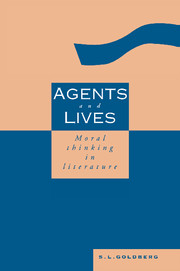Book contents
- Frontmatter
- Contents
- Acknowledgments
- Preface
- 1 ‘Perpetually moralists’ … ‘in a large sense’
- 2 ‘How to live’ and ‘how to live’
- 3 Agents and lives: making moral sense of people
- 4 ‘Doing good to others’: some reflections on Daniel Deronda
- 5 Moral thinking in The Mill on the Floss
- 6 Finding congenial matter: Pope and the art of life
- 7 Literary judgment: making moral sense of poems
- 8 Afterword: some limits of philosophy?
- Notes
- Index
- Frontmatter
- Contents
- Acknowledgments
- Preface
- 1 ‘Perpetually moralists’ … ‘in a large sense’
- 2 ‘How to live’ and ‘how to live’
- 3 Agents and lives: making moral sense of people
- 4 ‘Doing good to others’: some reflections on Daniel Deronda
- 5 Moral thinking in The Mill on the Floss
- 6 Finding congenial matter: Pope and the art of life
- 7 Literary judgment: making moral sense of poems
- 8 Afterword: some limits of philosophy?
- Notes
- Index
Summary
If the basic aim of moral philosophy is still to answer Socrates' question, ‘how to live?’, the contribution that ‘poetry’, imaginative literature, might make to answering it has been in dispute at least since Socrates asked the question. I must confess that I have never found the dispute particularly exciting or relevant to my interests as a literary critic, mainly because the dispute has usually been conducted by philosophers, who naturally assume that moral philosophy is the centre, so to speak, the place where truth and reason are to be found, and that literature is simply the application of moral ideas and feelings, somewhere on the periphery. (A surprising number of literary scholars and critics assume this too; we are a trusting – not to say credulous – lot when it comes to thinking.) True, some philosophers in recent years have questioned this assumption on philosophical grounds; but having grown up in the English tradition of evaluative literary criticism (which has, incidentally, very little to do with the New Criticism and other American schools of literary study), and so not having shared this assumption in the first place, I began some years ago to think about the relationship of literature and moral philosophy, but in a different way, from the literary critic's side, as it were.
- Type
- Chapter
- Information
- Agents and Lives , pp. xiii - xviiiPublisher: Cambridge University PressPrint publication year: 1993
- 1
- Cited by



